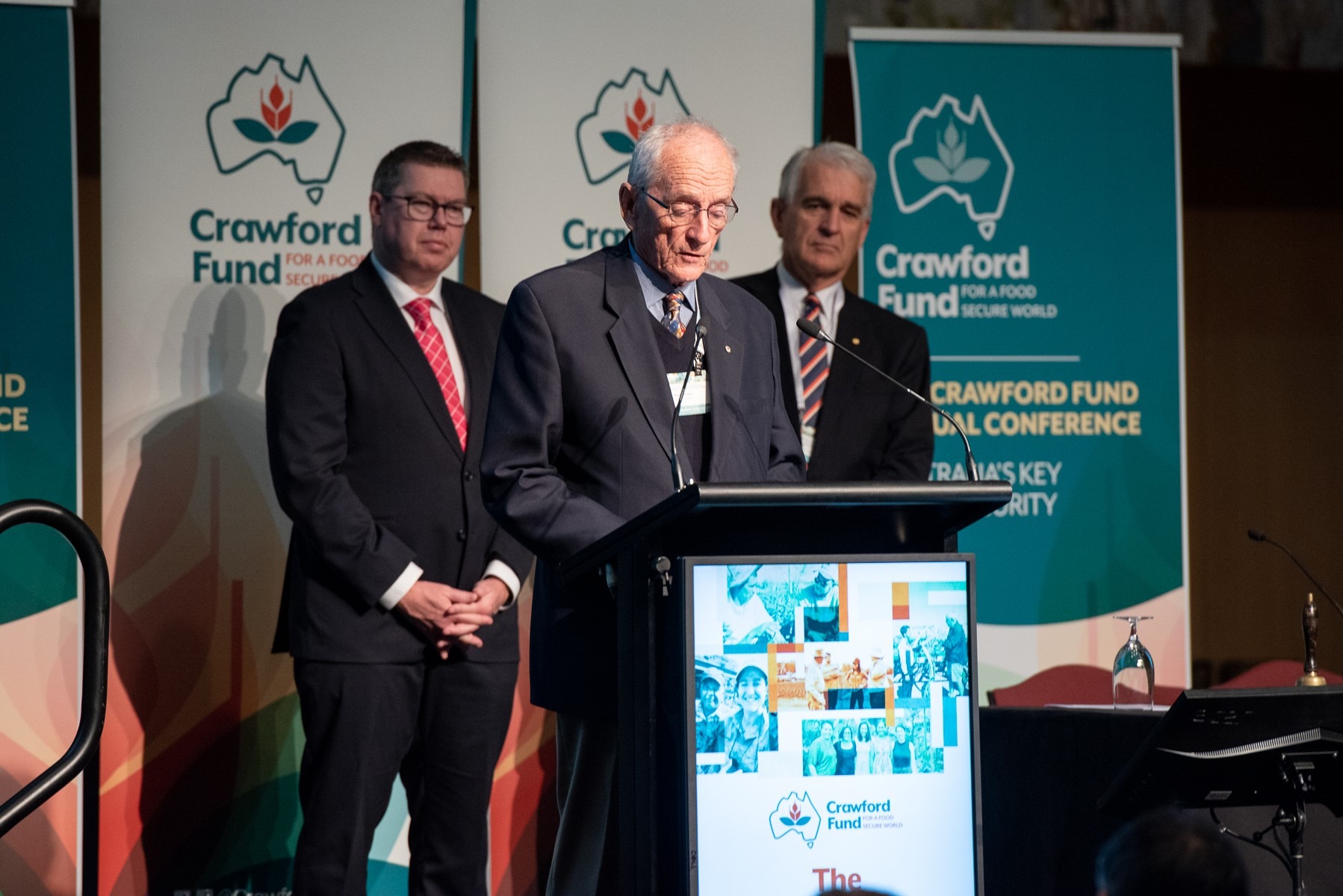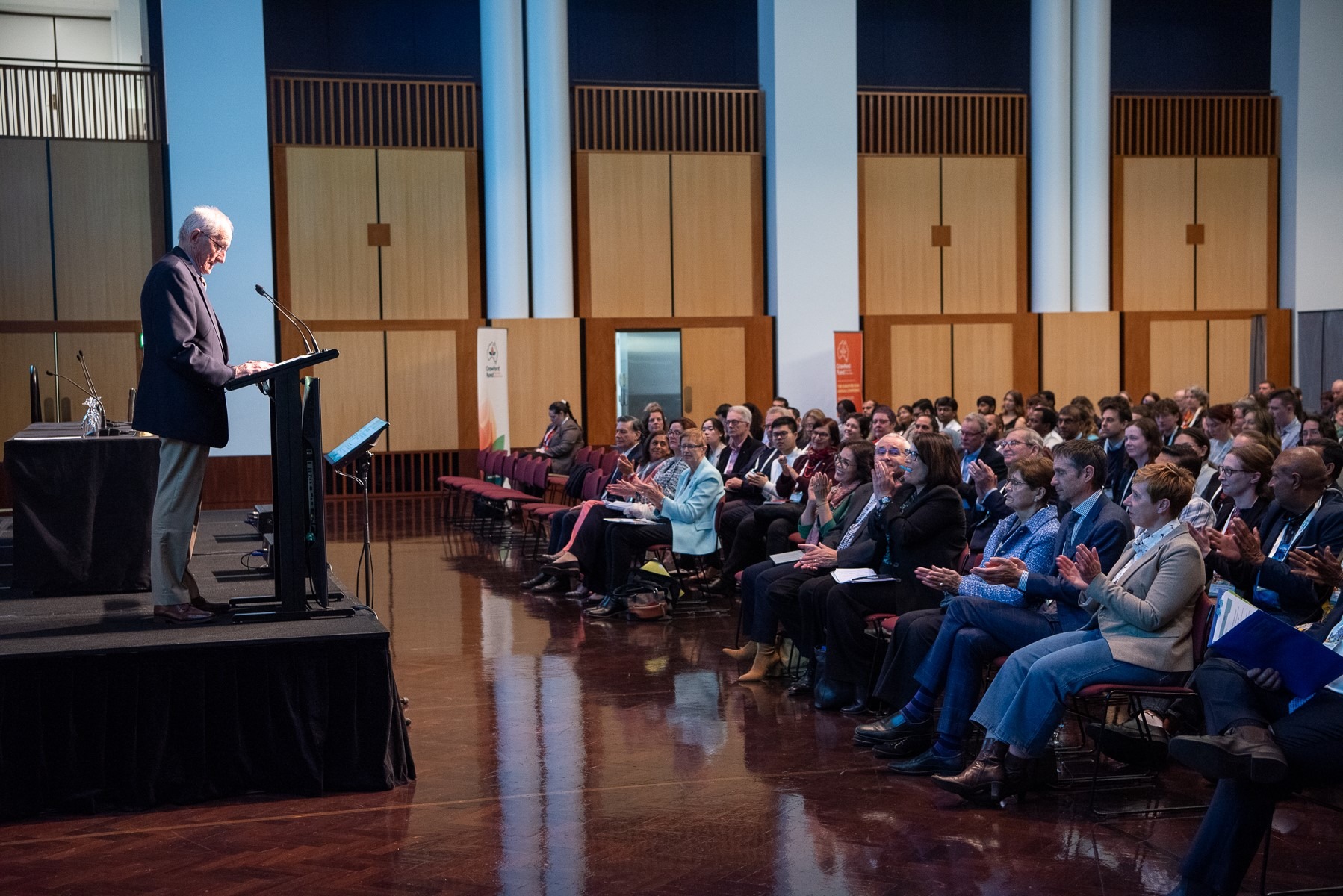

“How are we Going to Feed the World?”
September 2, 2024

At the 2024 Crawford Fund Annual Conference – Food and Nutrition Security: Transformative Partnerships, Local Leadership and Co-Design, we were honoured to have The Hon. Pat Conroy MP, Minister for International Development and the Pacific, and Minister for Defence Industry and Capability Delivery to open the event and make a presentation of the Crawford Fund Medal to internationally renowned wheat scientist Dr Tony Fischer, AM. The medal recognises those who have made a considerable and continued contribution to international agricultural research through the Crawford Fund’s programs and related activities.
The Crawford Fund’s annual conference – Australia’s key food security event – was held in the Great Hall, Parliament House, Canberra on 13 August with over 350 experts, policymakers, researchers, students and leaders hearing from specialists from Asia, the Pacific, Africa and Australia.
The recording of the opening address and medal presentation, with Tony’s acceptance, is available below.
There were many messages in Tony’s acceptance remarks and we share it below for the benefit of all of us learning from Tony’s decades in working for food security – starting from the time when the founder of the Crawford Fund, Em Prof Derek Tribe, first asked him in December 1960 – “Tony, how are we going to feed the world”. Here are Tony’s remarks:

Honourable Pat Conroy, Minister for International Development and the Pacific, Colleagues,
I am deeply honoured to receive this award from the Crawford Fund and for the chance to say a few words at today’s important event.
Firstly, an acknowledgement from the past. Upon finishing agricultural science at University of Melbourne, my animal science lecturer and later founder of the Crawford Fund, Derek Tribe, posed a question I had never before considered seriously. “Tony, he asked, how are we going to feed the world? A seed was sown in Derek’s office that afternoon in Dec 1960.
A decade later the boy from a wheat farm at Boree Creek in the southern NSW arrived to work at CIMMYT in Mexico just two weeks before his boss and wheat breeder, Dr Normal Borlaug, was awarded the Nobel Peace Prize for his pivotal role in the Green Revolution in South Asia, undoubtedly averting more famine in this populous region of small farmers.
For me the course was set for a lengthy career in wheat agronomy, physiology, breeding and farming systems, grappling with the challenge of delivering impact through the sciences of agriculture and socioeconomics.
But firstly, another memorable message from December 1960: at a farewell dinner for the rowdy new agricultural graduates, our biochemistry professor, Michael Byrt, dared to deliver a valedictory speech entitled simply “Measure it”, excellent advice that I have never forgotten.
However, I have learnt over the years that measurement must be augmented by data analysis, unrelenting curiosity, and reporting and publication, followed by promotion of your conclusions when the evidence is sound.
And my final lesson was to not lose sight of the big picture goals in agriculture, which include positive impacts on food security, the welfare of farmers, and sustainability of the natural resource base of agriculture. This inevitably involves effective collaboration with scientists and others connecting your research to the real world.
I stumbled in some of these lessons myself, but was lucky much of the time: one good fortune being my early experiences from the family wheat farm, this especially helped me early on with Norman Borlaug. Another was encountering inspirational and collaborative people along the way. I could mention many such people, but one example suffices.
I refer to my 630-page book, “Crop Yields and Global Food Security. Will yield increase continue to feed the world?”, coauthored with CIMMYT colleagues, namely Derek Byerlee an ag economist from Ororoo SA and Greg Edmeades, a maize scientist from a dairy farm in Cambridge NZ. ACIAR and GRDC generously published the book 10 years ago, more good fortune! It is free to download from the ACIAR website and has now been cited extensively.
In finishing I want the express my gratitude to the Crawford Fund, not only for my award today, but also for being true over its almost 40 years to the wonderful maxim: Doing well by Doing good, promoted from early on by Professor Derek Tribe, and leading to his 1991 book of the same title. Enlightened self-interest was blunter summary that Derek often used.
Australia does good with its overseas agricultural aid program, principally delivered by ACIAR, which supports, in neighbouring developing countries, partnership agricultural research. This helps lifts their agricultural productivity and research capacity.
As a result, Australia does well, for example, from new insights into common agricultural problems, early warning on exotic biotic agents which threaten our agriculture, and access to novel crop germplasm. But the benefits go beyond agriculture to strengthening of our security: building trust and invaluable soft power with our neighbours and especially contributing to their economic growth.
I also wish to acknowledge the strong effort that Crawford Fund has made in the last 20 years or so to engage the refreshing idealism of early career scientists in the task of Australia’s international agricultural research. I especially highlight the foresight and energy of Cathy Reade in this. Forty of you are here today on CF scholarships, representing the many others linked to the CF and upon whom our regional future as good neighbours through agricultural research and development aid depends.
Finally, I wish to express enduring gratitude to my wife Miriam, who is here this morning: an ingeniero agronomo from Chile, dedicated plant pathologist, and pioneer plant molecular biologist, as well as strong and loving mother and indispensable partner in my career.




 0
0